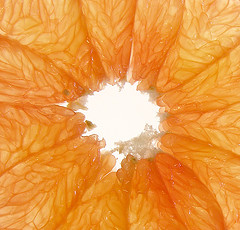
 Enjoy the occasional morning grapefruit? Then you’re in luck. It’s full of health benefits, including the ability to help your liver clear toxins out of the body. However, you’re probably aware of the debate about this fruit-does it help prevent cancer or contribute to it? We’ve gathered some information here to help you decide.
Enjoy the occasional morning grapefruit? Then you’re in luck. It’s full of health benefits, including the ability to help your liver clear toxins out of the body. However, you’re probably aware of the debate about this fruit-does it help prevent cancer or contribute to it? We’ve gathered some information here to help you decide.
According to The World’s Healthiest Foods (WHFoods), “grapefruit juice increases the production and activity of liver-detoxification enzymes responsible for preparing toxic compounds for elimination from the body.” Apparently it works in two steps-first, it increases the activity of stage-1 enzymes that work on toxins to make them more attractive to stage-2 enzymes. Then, it increases the activity of stage-2 enzymes that protect cells against toxins and oxidative stress. So if you’re looking for a natural detox, you may want to start with this tasty fruit.
The effects of grapefruit don’t stop there. It may help protect against colon cancer. According to animal studies, grapefruit increased cancer-cell death and the production of normal colon cells in rats injected with carcinogens.1-2 Another study showed that consuming the bioactive compounds found in grapefruit seed and pulp may help suppress the development of colon cancer.3 The fruit also contains flavonoids which can slow the growth of cancer cells. According to a study published in the Journal of Nutritional Biochemistry, a particular flavonoid in grapefruits helps repair damaged DNA in human prostate cancer cells.4
So what about the debate over grapefruit and breast cancer? You may recall the news about the study that seemed to link grapefruit consumption with an increased risk for developing breast cancer. That study of 50,000 post-menopausal women found that those that regularly consumed grapefruit had a 30% higher risk of breast cancer. However, you may have missed the follow-up study, published in the same journal months later. That one analyzed a large group of nurses for over 20 years and concluded that grapefruit actually lowered the risk of breast cancer in women not using hormone-replacement therapy (HRT) by over 20%, and protected women from certain types of breast cancer at an even higher rate. Most importantly, this study found no correlation between grapefruit or grapefruit juice intake and higher levels of estrogen, and the authors said that the findings did not support any adverse effect of grapefruit on breast-cancer risk.
Even if grapfruit has been absolved of the breast-cancer link, it has been shown to interfere with the absorption of certain drugs. Just like it can boost the activity of some enzymes, it can interfere with the activity of other enzymes-including those that break down various drugs in the digestive system. According to the Mayo Clinic, the result can be excessively high levels of the drug in the blood. Drugs to watch out for include certain calcium channel blockers, certain anti-depressants, some cholesterol-lowering drugs, and some anti-seizure medications. (Ask your doctor for more information.)
Where do you stand on the grapefruit debate? Unless you’re concerned about drug interactions, we’d recommend you go for it. Grapefruit is full of vitamin C, potassium, and lycopene, has cancer-protecting qualities, and tastes great in so many ways. WHFoods recommends you start your breakfast with half a grapefruit or a glass of grapefruit juice, or try a half drizzled with honey and broiled for 2 minutes for dessert, topped with a fresh mint leaf.
How do you enjoy your grapefruit? Let us know if you have tempting recipes!
1Turner, Vanamala J, Leonardi T, Patil B, Murphy M, Wang N, Pike L, et al. Grapefruit and its isolated bioactive compounds act as colon cancer chemoprotectants in rats. The 228th ACS National Meeting, Philadelphia, PA, August 24, 2004. 2004.
2Suzuki, Kohno H, Sugie S, Murkami A, Yano M, Ohigashi H, Tanaka T. Citrus nobiletin inhibits azoxymethane-inducved rat colon carcinogenecis. The 228th ACS National Meeting, Philadelphia, PA, August 24, 2004. 2004.
3Vanamala J, Leonardi T, Patil BS, et al. (June 2006). “Suppression of colon carcinogenesis by bioactive compounds in grapefruit”. Carcinogenesis 27 (6): 1257–65.
4Gao K, Henning SM, Niu Y, Youssefian AA, Seeram NP, Xu A, Heber D. The citrus flavonoid naringenin stimulates DNA repair in prostate cancer cells. J Nutr Biochem. 2006 Feb;17(2):89-95. Epub 2005 Jun 20. 2006. PMID:16111881.
Photo courtesy 3dphoto.net via Flickr.com.

